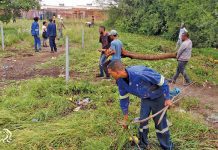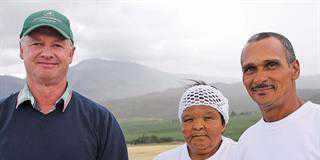A law privatising millions of hectares of communal land has been held up for years by court action and opposition from traditional leaders. In the meantime, pressure on adjacent commercial farming districts keeps increasing, with tensions reaching breaking point in some areas. Stephan Hofstätter reports on a vital piece of land reform legislation that seems locked in limbo.
M’baula village near Phalaborwa in Limpopo is typical of most wretchedly poor rural backwaters in South Africa. A signature sight is children carting water canisters in wheelbarrows from one of two boreholes serving over 1 600 families.
Most men have left to look for work in towns or cities, and are now swelling the ranks of the urban unemployed living in squatter camps. Those who remain in these villages live off pensions or child support grants. Yet M’baula is sitting on a potential gold mine.
During the homeland era, the former Gazankulu government granted it a 6 000ha game park bordering the Kruger National Park, stocked with the big five. Many plans to develop lodges along the river in the park fell through and it wasn’t until 1996 that the village’s traditional authority signed a lease with a local farmer who planned to conduct hunting safaris in the park.
He paid more than R300 000 in lease fees, but was murdered before a hunting licence was issued, and the plans fell through. Eventually a tourism developer secured permission under mysterious circumstances to build a luxury lodge in the park. But this and other plans have since been shelved amid failure to comply with environmental regulations.
Not that any of these plans have made any difference to the lives of the people of M’baula. They say the only impact the park has had on their lives is seeing convoys of 4x4s roaring through the village. For years the village has been alive with rumours of elephant poachers paying small fortunes to hunt in the park. And villagers have noticed how the chief and his close associates were building new homes, investing in improvements and throwing lavish weddings, despite the absence of any declared income.
Their chief, former Barberton prison warder Goliath Mabunda, was eventually ousted, although he continues to insist he hasn’t stolen a cent and was simply the victim of a smear campaign by factions in the community wishing to depose him. Last year a traditional leader enjoying broader support was installed and new investors have started sniffing around again. But local observers say until the question of land ownership is settled, and communal tenure is broken into individual title or community ownership, better-quality investors will stay away.
As long as the land remains communal it continues to fall under the jurisdiction of unaccountable local elites, providing ample opportunity for nepotism and abuse of power. Clear the way for Clara “If the community had title to the land it would be much easier to get investments,” explains school teacher and former civics chairperson Tansen Maunde. “The way it is now just creates a lot of corruption, with the royal family spending the money as they want and people without much capital coming to invest.”
Another community leader confirms financial accountability remains a serious concern as long as traditional leaders hold the purse strings. It is precisely this reform – changing communal tenure to freehold title, so that there are clear rules governing the use and ownership of land, rather than vague, manipulable customary practices – that the Communal Land Rights Act (Clara) seeks to introduce. But the task of converting 16 million hectares of communal land throughout SA to freehold is arguably more complex and equally politically explosive than the land reform programme (including transferring thousands of white-owned farms to blacks) government has thus far focused on. Clara essentially converts former tribal land still nominally held by the state or Zulu monarch into freehold tenure.
Communities or individuals will be granted title to land, which can be inherited. Women and men will enjoy equal ownership rights. It makes provision for buying land outside former homelands in cases of conflicting or overlapping rights to the same land. Commercial “border” farms will be bought up for this process. The law allows for these farms to be expropriated, with appropriate compensation, should the farmers be unwilling to sell. Senior officials have made it clear this power would be used in the face of resistance, and land analysts predict border farms would be the subject of South Africa’s first forced sales.
In the end, resistance has come from a different quarter. Traditional leaders, who rightly see the act as eroding their powers by curtailing their land allocation functions, have fought it tooth and nail, especially in politically volatile KZN. The Department of Land Affairs estimates more than 21 million people, or almost half of South Africa’s population, live in communal areas. These are areas that were part of the homeland system under the apartheid government, all plagued by intense poverty, partly because conflicting land rights and a lack of tenure security scares off outside investors, discourages local entrepreneurs from risking capital on improvements, and prevents rural villagers from emulating urbanites who use their properties as security for cheap credit. It also prevents large swathes of potentially highly productive agricultural land in SA from being farmed commercially by black entrepreneurs.
The result is that in many of SA’s poorest areas, land potentially worth billions remains undeveloped or is exploited for the exclusive benefit of a corrupt royal elite. Pressure on surrounding commercial farmland in border districts is escalating, and tensions in some areas are rising to breaking point – as was amply illustrated by farm manager Ken Eva’s murder in Melmoth, KZN recently.
Plans to draft Clara have been on the cards since 1994. In 2004 Clara became the last major piece of land reform legislation to be passed, but it has yet to be implemented. This is partly because colonial and apartheid regimes often rewarded pliable rulers and supporters with land rights at the expense of their opponents, so disentangling these from legitimate customary rights opens a can of worms. Moreover, surveying all communal land and registering new-order property rights is a prohibitively expensive administrative task not considered a budget priority by a government whose thinking was dominated by fiscal austerity and an urban-led bias in economic growth plans.
Initially the Department of Land Affairs budgeted R68 million per year over 15 years for implementing Clara. It has since revised this to upwards of R500 million per year, mostly because surveying costs hadn’t been factored in. An estimated 75% of communal land remains to be surveyed. But the most serious hurdle remains opposition from traditional leaders, who have repeatedly blocked the legislation until they secured concessions that have now led to the constitutional challenge.
An earlier draft of the law was met with stiff opposition by traditional leaders, especially in KZN, with some threatening bloodshed if it was enacted. IFP leader Mangosuthu Buthelezi described it as the final destruction of the Zulu monarchy. Former deputy president Jacob Zuma is widely credited with brokering a compromise by inserting a clause in the act that allows the councils that will manage the land once converted to freehold to be dominated by unelected chiefs. The so-called “Zuma clause” sparked protests that culminated in a series of parliamentary hearings and resulted in some concessions from traditionalists. The quota for women serving on land councils was raised, and communities were given a greater say in drafting the rules for the new councils.
But these have not gone far enough for some communities. The Makuleke in Limpopo were granted title to their ancestral land inside the Kruger National Park and now use it as a profitable tourism joint venture that has been hailed as a model compromise between land restitution and conservation. Now they fear the new law will allow unscrupulous elements in the greater traditional authority under whose jurisdiction their headmen fall to usurp their power and divert income they earn from their land.
The Makuleke, together with three other communities, have approached law firm Webber Wentzel Bowens and the Legal Resources Centre to take their case to the highest court in the land. They will argue granting land administration powers to unelected councils effectively creates an undemocratic fourth tier of government, which is not authorised by the constitution. The Department of Land Affairs refuses to comment on the case.
Director general Glen Thomas says this is because previous statements made in parliament by the law’s architect, Sipho Sibanda, will be used against the department in court. Thomas has instructed officials to maintain a blanket silence. He admits his department may have underestimated the complexities of implementing the law, but denies his officials are dragging their feet. “We have drafted comprehensive implementation plans so that we are ready for roll-out once the court process is over.”
In the meantime, M’baula’s conundrum is replicated throughout the country. Dirt-poor communities have customary rights over prime beachfront real estate in the Eastern Cape, mineral-rich territories in North West and pristine wildernesses in KwaZulu-Natal and Mpumalanga. But many will continue to derive no benefits from their considerable assets, either because investors line the pockets of corrupt elites or divert capital to places where tenure rights are more predictable. And as poverty continues to grow in these abandoned backwaters, so do the security risks for thousands of border farmers. |FW













